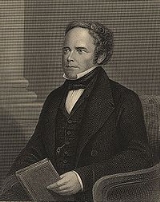
William Thomas Brande
Encyclopedia
William Thomas Brande FRS (11 January 1788 – 11 February 1866), English chemist
.
Brande was born in London
, England
. After leaving Westminster School
, he was apprenticed, in 1802, to his brother, an apothecary
, with the view of adopting the profession of medicine. However, Brande's bent was towards chemistry, a sound knowledge of which he acquired in his spare time. In 1812 he was appointed professor of chemistry to the Apothecaries' Society, and delivered a course of lectures before the Board of Agriculture in place of Sir Humphry Davy, whom in the following year he succeeded in the chair of chemistry at the Royal Institution
, London. From about 1823 onwards, Brande worked increasingly with the Royal Mint, eventually becoming Superintendent of the Coining and Die Department.
Brande's Manual of Chemistry, first published in 1819, enjoyed wide popularity, and among other works he brought out a Dictionary of Science, Literature and Art in 1842. He was working on a new edition when he died at Tunbridge Wells
.
Brande died in 1866, and is buried in the large metropolitan cemetery of West Norwood, London (grave 1177, square 98).
Chemist
A chemist is a scientist trained in the study of chemistry. Chemists study the composition of matter and its properties such as density and acidity. Chemists carefully describe the properties they study in terms of quantities, with detail on the level of molecules and their component atoms...
.
Brande was born in London
London
London is the capital city of :England and the :United Kingdom, the largest metropolitan area in the United Kingdom, and the largest urban zone in the European Union by most measures. Located on the River Thames, London has been a major settlement for two millennia, its history going back to its...
, England
England
England is a country that is part of the United Kingdom. It shares land borders with Scotland to the north and Wales to the west; the Irish Sea is to the north west, the Celtic Sea to the south west, with the North Sea to the east and the English Channel to the south separating it from continental...
. After leaving Westminster School
Westminster School
The Royal College of St. Peter in Westminster, almost always known as Westminster School, is one of Britain's leading independent schools, with the highest Oxford and Cambridge acceptance rate of any secondary school or college in Britain...
, he was apprenticed, in 1802, to his brother, an apothecary
Apothecary
Apothecary is a historical name for a medical professional who formulates and dispenses materia medica to physicians, surgeons and patients — a role now served by a pharmacist and some caregivers....
, with the view of adopting the profession of medicine. However, Brande's bent was towards chemistry, a sound knowledge of which he acquired in his spare time. In 1812 he was appointed professor of chemistry to the Apothecaries' Society, and delivered a course of lectures before the Board of Agriculture in place of Sir Humphry Davy, whom in the following year he succeeded in the chair of chemistry at the Royal Institution
Royal Institution
The Royal Institution of Great Britain is an organization devoted to scientific education and research, based in London.-Overview:...
, London. From about 1823 onwards, Brande worked increasingly with the Royal Mint, eventually becoming Superintendent of the Coining and Die Department.
Brande's Manual of Chemistry, first published in 1819, enjoyed wide popularity, and among other works he brought out a Dictionary of Science, Literature and Art in 1842. He was working on a new edition when he died at Tunbridge Wells
Royal Tunbridge Wells
Royal Tunbridge Wells is a town in west Kent, England, about south-east of central London by road, by rail. The town is close to the border of the county of East Sussex...
.
Brande died in 1866, and is buried in the large metropolitan cemetery of West Norwood, London (grave 1177, square 98).

